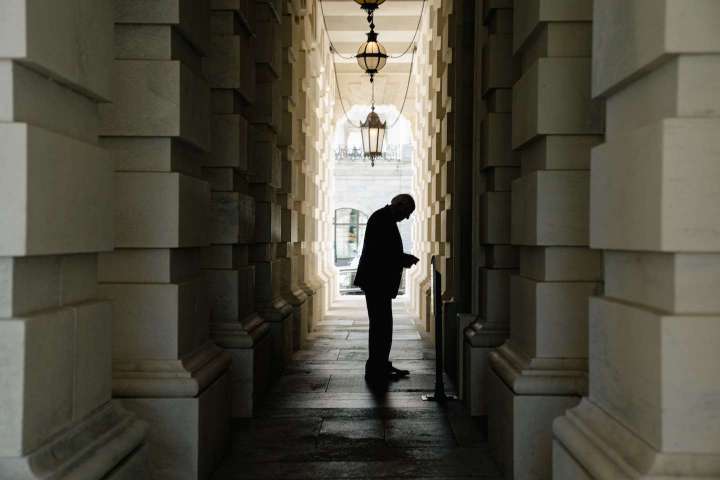Senate passage of the Inflation Reduction Act is a much-needed political win for President Biden and the Democratic Party. But before the multi-hundred-billion tax-health-climate package rolls through the House, en route to a White House signing ceremony, consider one of this saga’s losers: Sen. Bernie Sanders (I-Vt.). He got far less of what he wanted than did his intra-caucus nemesis, Sen. Joe Manchin III (D-W.Va.), who cut a deal with Majority Leader Sen. Charles E. Schumer (D-N.Y.) in secret negotiations of which Sanders was apparently unaware.
Come on, Bernie. Admit Joe Manchin outmaneuvered you.

It’s a remarkable denouement to a ferocious Sanders-Manchin battle that was not only intriguing as a political personality clash, and rich in lessons about how Washington really works, but also possibly consequential for Democrats’ ideological future.
Sanders spearheads the left wing of the Democratic Party (with which he nevertheless stubbornly does not fully affiliate). Buoyed by Democrats’ trifecta win in the 2020 elections, Sanders in mid-2021 sought to use the party’s control of the White House, House and a 50-50 Senate to advance $3.5 trillion, over 10 years, in new and expanded programs — on top of $1.9 trillion of pandemic relief Congress approved shortly after Biden’s inauguration.
The Sanders plan included everything from a civilian climate corps to tuition-free community college; he wanted to pay for it with taxes on corporations, estates and high-income individuals. Sanders called the $3.5 trillion the “minimum” number, scaled down from an initial $6 trillion.
Manchin balked, hinting $1.5 trillion would be his maximum. The Vermonter publicly pressured Manchin, chiding him for making vague demands and protecting an unjust economic status quo. On Oct. 15, Sanders published an op-ed in a West Virginia newspaper calling out Manchin and Sen. Kyrsten Sinema (D-Ariz.) for obstructing benefits to seniors and children.
“This isn’t the first time an out-of-stater has tried to tell West Virginians what is best for them despite having no relationship to our state,” countered Manchin, who knows his state and its unique working-class culture intimately — certainly better than Sanders does. With inflation on the rise, Manchin said, he would not vote for a “reckless” expansion of government: “No op-ed from a self-declared Independent socialist is going to change that.”
It’s hard to imagine two more dissimilar legislators than the Brooklyn-born democratic socialist, who represents a state with nearly 200 organic dairy farms, and the product of coal-mining Farmington, W.Va., who earned his degree in business from West Virginia University on a football scholarship.
Shortly after this exchange, the two tried a Capitol Hill peace conference, ending with Manchin’s slightly mocking comment in the Senate parking lot: “Never give up, Bernie.”
Last month, Sanders accused Manchin of “intentionally sabotaging” Biden’s agenda. “We continued to talk to Manchin like he was serious. He was not,” Sanders fumed to ABC News’s Martha Raddatz on July 17.
Brushing Sanders off, but entertaining private pleas from moderate Democrats, some of whom no doubt quietly sympathized with his stand all along, Manchin two days later approached Schumer to talk. The rest is history.
Advantage, Manchin — on both substance and process. Substantively, the bill’s very name accepts his view that inflation is America’s main issue. None of his dealbreakers, such as a family and medical leave subsidy, made it into the bill; goodies for his fossil-fuel allies did. The $369 billion for green energy and climate goals is substantial — but far smaller than the $555 billion that Democrats initially sought and nowhere near a Green New Deal. Corporate America faces only a modest tax increase and Medicare drug price restraint.
Tepidly progressive as it is, this could be the last such bill for years, given Congress’s limited legislative bandwidth and the likelihood of a Republican House in November.
On process, the deal vindicates Manchin’s style, an inside game during which he ignored — or reveled in — Sanders’s outbursts while leveraging his vote (and Sinema’s). He focused on West Virginia’s interests and did not move until his party leadership’s fear of electoral wipeout in November peaked. Now, among Democrats who might have scapegoated him, all is forgiven; if they hold the Senate, he’ll be the hero.
What a contrast to Sanders’s political modus operandi, as he expressed it in 2016: “What we need is a political movement in which millions of people stand up and demand that our government represent all of us, not just the billionaire class and large corporations.”
On net, events of the past two weeks help reposition Democrats closer to the political center — as Republicans careen rightward. We’ll never know if Democrats would have been even better off if they had met Manchin halfway sooner.
And Sanders? He’s damning the bill with faint praise, calling it “better than nothing.” On the Senate floor, he criticized the legislation’s insufficiencies and alienated Democratic colleagues by making them cast “no” votes, for purely procedural reasons, on his amendments to restore a $300 per month child tax credit and a higher corporate tax rate — which they would otherwise support. They did not appreciate it. “Come on, Bernie,” Sen. Sherrod Brown (D-Ohio) grumbled into a hot mic.
When it came time for final passage, all 50 senators who conference with the Democrats voted “aye,” Bernie Sanders included.






